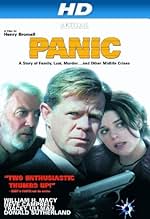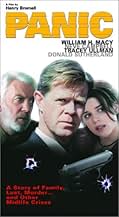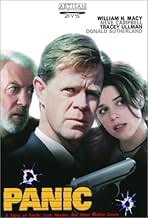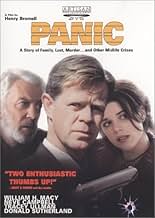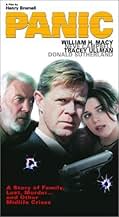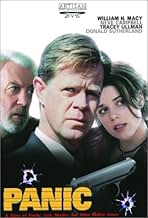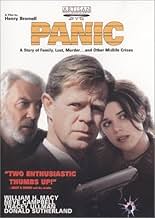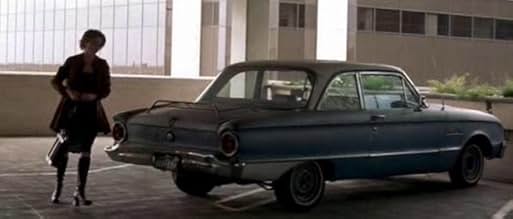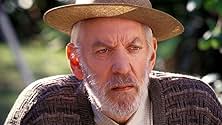IMDb-BEWERTUNG
6,6/10
9564
IHRE BEWERTUNG
Alex, ein Auftragskiller, versucht, aus dem Familienunternehmen auszusteigen, aber sein Vater lässt es ihm nicht zu.Alex, ein Auftragskiller, versucht, aus dem Familienunternehmen auszusteigen, aber sein Vater lässt es ihm nicht zu.Alex, ein Auftragskiller, versucht, aus dem Familienunternehmen auszusteigen, aber sein Vater lässt es ihm nicht zu.
- Auszeichnungen
- 2 Nominierungen insgesamt
Andrea Baker
- Candice
- (as Andrea Taylor)
Steven Moreno
- Sean
- (as Steve Moreno)
Empfohlene Bewertungen
7=G=
"Panic" is a captivating, blurred-genre film about a brooding and conflicted middle aged hitman's reconciliation of infatuation with a younger uninhibited hairstylist, his love of wife and son, his duty to his employer/father with his own identity. Although the film has a nebulous purpose and an ambiguous ending, it is a superb production in almost all aspects. The characters' clarity and sincerity in such an improbable story may both fascinate and annoy audiences.
I gotta stop buying DVDs sight unseen. It happened with Affliction and now with Panic. I bought into the rave reviews and felt disappointed after watching it. This could have been a truly great film...if ONLY they had focused on the father/son relationship and left that godawful May/September romance on the cutting room floor. If only Neve Campbell's character had some smarts, maybe even a little class to separate her from the rest of the LA airheads it MIGHT have worked. She was nothing but a tease and it distracted from the movie greatly. She and Macy had NO chemistry together and their scenes were a total waste of time. Every time they were on screen together, you keep asking the same thing: When are we going to see Sutherland again? I'm a child of the 60's when movies were VERY good. So, when I hear some young person praise a recent movie as great, I must remember that "great" movies made today would have been only "good" in the sixties. I refer back to what I call the John Carpenter Syndrome. It works like this. John Carpenter made some good thrillers/horrors back in the seventies. But compared to the crap being produced today, they seem like GREAT films. People must remember that they're good films existing in a garbage heap of crap will seem better than they are.
The `banality of evil' has long been a source of fascination for those artists exploring the dark side of human nature. Gloomy houses filled with vengeful spirits or twitching psychos hold less fear for the common man than the sudden discovery that the `people next door,' the PTA member down the street, or the social director for the local church youth group are the true villains who surround us unnoticed, people whose very `normalcy' serves to mask the evil within. For only when the mask is finally ripped off and we at last get to see what we have been living next to all along do we come to realize how very tenuous is our security and safety in this world. What could be scarier than that?
In this category of works, `Panic' emerges as a genuinely chilling, emotionally unsettling psychological thriller, short on gratuitous violence and long on characterization and mood. Writer/director Henry Bromell has fashioned a dark, disturbing tale of a man named Alex (William H. Macy) who seeks the professional help of a therapist played by John Ritter. Alex's problem is a decidedly unique one: it seems that, since he's been a teen, he has served as hit man for his father (Donald Sutherland) whose mysterious, shady `business' apparently calls for the elimination of certain parties at the request of unknown `clients.' Alex is a seemingly good man, devoted to his wife and son, who has somehow found a way to distance himself emotionally and morally from the heinous crimes he commits. Yet, obviously, Alex has arrived at a point of moral reckoning for how else to explain his sudden need to unburden himself to this total stranger? Macy gives a brilliant performance as Alex, showing, in his totally understated reactions to the people and events around him, what it is like to be buttoned up so tight that even with all the mayhem and filial abuse he's experienced in his life he is able to truthfully say `I don't know if I've ever been angry' even at his father who got him into this life in the first place.
What makes `Panic' so unsettling is that it violates all our comforting notions about the ties that bind father to son and family members to each other. Rather than setting a fine moral example for their child, both of Alex's parents, Michael (Donald Sutherland) and Deidre (Barbara Bain), have actually groomed him to become a cold-blooded killer. Yet, life seems to go on in surface ease within the confines of not only that family but Alex's own family as well. Alex keeps the truth hidden from both his wife, Martha (Tracy Ullman) and his 6-year old son, Sammy (David Dorfman), allowing them to function almost as any other normal suburban family.
Yet, Alex has other, perhaps more mundane problems as well. He meets a somewhat disturbed 23-year old fellow patient named Sarah (Neve Campbell) to whom he feels an immediate attraction. Tentatively, these two lost souls grope towards each other, both of them hoping to find in the other that which is lacking in themselves. But in many ways, Alex is actually a man of strong moral character in certain aspects of his life and he agonizes over taking the initial step towards consummating their relationship, knowing it will harm the wife he loves but no longer feels attracted to. Bromell's sophisticated screenplay refuses to spell out every psychological detail for the audience, allowing us to make our own connections, draw our own conclusions and reach our own moral judgments. As director as well, Bromell establishes and maintains a mood of almost heartbreaking melancholy and sadness. Characters rarely speak above a hush; the camera glides slowly along taking in the scene at a leisurely, unhurried pace; and the haunting musical score heightens the strange unreality of the world which these people have come to inhabit, a world that seems to call into question everything we take for granted in the area of morality, ethics and basic common decency.
The performances from every member of the cast (right on down to little David Dorfman) are letter perfect. Each of these fine actors knows exactly the right note to hit in every scene, never cutting against the grain of understated seriousness that Bromell has established.
`Panic' is a small, underrated gem that lingers long in one's memory.
In this category of works, `Panic' emerges as a genuinely chilling, emotionally unsettling psychological thriller, short on gratuitous violence and long on characterization and mood. Writer/director Henry Bromell has fashioned a dark, disturbing tale of a man named Alex (William H. Macy) who seeks the professional help of a therapist played by John Ritter. Alex's problem is a decidedly unique one: it seems that, since he's been a teen, he has served as hit man for his father (Donald Sutherland) whose mysterious, shady `business' apparently calls for the elimination of certain parties at the request of unknown `clients.' Alex is a seemingly good man, devoted to his wife and son, who has somehow found a way to distance himself emotionally and morally from the heinous crimes he commits. Yet, obviously, Alex has arrived at a point of moral reckoning for how else to explain his sudden need to unburden himself to this total stranger? Macy gives a brilliant performance as Alex, showing, in his totally understated reactions to the people and events around him, what it is like to be buttoned up so tight that even with all the mayhem and filial abuse he's experienced in his life he is able to truthfully say `I don't know if I've ever been angry' even at his father who got him into this life in the first place.
What makes `Panic' so unsettling is that it violates all our comforting notions about the ties that bind father to son and family members to each other. Rather than setting a fine moral example for their child, both of Alex's parents, Michael (Donald Sutherland) and Deidre (Barbara Bain), have actually groomed him to become a cold-blooded killer. Yet, life seems to go on in surface ease within the confines of not only that family but Alex's own family as well. Alex keeps the truth hidden from both his wife, Martha (Tracy Ullman) and his 6-year old son, Sammy (David Dorfman), allowing them to function almost as any other normal suburban family.
Yet, Alex has other, perhaps more mundane problems as well. He meets a somewhat disturbed 23-year old fellow patient named Sarah (Neve Campbell) to whom he feels an immediate attraction. Tentatively, these two lost souls grope towards each other, both of them hoping to find in the other that which is lacking in themselves. But in many ways, Alex is actually a man of strong moral character in certain aspects of his life and he agonizes over taking the initial step towards consummating their relationship, knowing it will harm the wife he loves but no longer feels attracted to. Bromell's sophisticated screenplay refuses to spell out every psychological detail for the audience, allowing us to make our own connections, draw our own conclusions and reach our own moral judgments. As director as well, Bromell establishes and maintains a mood of almost heartbreaking melancholy and sadness. Characters rarely speak above a hush; the camera glides slowly along taking in the scene at a leisurely, unhurried pace; and the haunting musical score heightens the strange unreality of the world which these people have come to inhabit, a world that seems to call into question everything we take for granted in the area of morality, ethics and basic common decency.
The performances from every member of the cast (right on down to little David Dorfman) are letter perfect. Each of these fine actors knows exactly the right note to hit in every scene, never cutting against the grain of understated seriousness that Bromell has established.
`Panic' is a small, underrated gem that lingers long in one's memory.
Why Panic never got a good theatrical release is easily seen: it's much too smart, and audiences would have probably had a difficult time with it, comparing it to American Beauty in its probing of a midlife crisis, and Sopranos and Analyze This in it's study of illegal goings-on amidst family life. Though Panic may seem to derive from unoriginal material, Brommel's lifelike characters coupled with deft dialogue and observant direction make the film a realistic look at the undoing of a middle aged man.
William H. Macy stars as Alex, a hitman who works for his father's (Sutherland) contract-killing business. He leads a double life, with his wife (Ullman) and son unaware of his real trade. In his middle-age, he becomes increasingly disgusted with what he has done all his life. Under his calm, collected facade stirs repressed resentment for his father's controlling grasp on his life. When he meets a young woman(Campbell) he feels invigored and decides it's time to quit the family business.
The fact that writer/director Henry Brommel decided to make the profession his main character was trying to break away from contract-killing is disposable. He could have easily substituted it with any undesirable profession; his characters are so well-developed and believable, scenes handled so smoothly and realisticly and dialogue written so insightfully and naturally that the focus falls on Macy's conflicted character rather than his job as a hitman. Brommel's script feels like a Shakespearean tragedy, with a definite theme of destiny running throughout.
In Alex, Macy creates a tragic, easily sympathetic character, and turns in yet another brooding, great performance, as can always be expected. Donald Sutherland is also effectively abrasive and abusive as his overbearing father, and Ullman's dramatic turn as Macy's wife is a welcome change for the comedian. Consider a scene in a bicycle shop, where her mood subtly darkens and peaks in an affecting scene of emotional confusion.
Henry Brommel's first feature, Panic is a film that is well-crafted in its sincerity. With a first-rate cast, a plausible script, terse dialogue, and nice direction, this character-study is hopefully just a taste of Brommel's aptness for creating characters that seem real.
8 out of 10
William H. Macy stars as Alex, a hitman who works for his father's (Sutherland) contract-killing business. He leads a double life, with his wife (Ullman) and son unaware of his real trade. In his middle-age, he becomes increasingly disgusted with what he has done all his life. Under his calm, collected facade stirs repressed resentment for his father's controlling grasp on his life. When he meets a young woman(Campbell) he feels invigored and decides it's time to quit the family business.
The fact that writer/director Henry Brommel decided to make the profession his main character was trying to break away from contract-killing is disposable. He could have easily substituted it with any undesirable profession; his characters are so well-developed and believable, scenes handled so smoothly and realisticly and dialogue written so insightfully and naturally that the focus falls on Macy's conflicted character rather than his job as a hitman. Brommel's script feels like a Shakespearean tragedy, with a definite theme of destiny running throughout.
In Alex, Macy creates a tragic, easily sympathetic character, and turns in yet another brooding, great performance, as can always be expected. Donald Sutherland is also effectively abrasive and abusive as his overbearing father, and Ullman's dramatic turn as Macy's wife is a welcome change for the comedian. Consider a scene in a bicycle shop, where her mood subtly darkens and peaks in an affecting scene of emotional confusion.
Henry Brommel's first feature, Panic is a film that is well-crafted in its sincerity. With a first-rate cast, a plausible script, terse dialogue, and nice direction, this character-study is hopefully just a taste of Brommel's aptness for creating characters that seem real.
8 out of 10
This film has so many good things about it that watching it was frustrating for me, since I could never swallow the story line.
William H. Macy plays Alex, a hit man who is carrying on the family business under pressure from his father. The first obstacle for me was accepting the mild-mannered Macy as a hit man. I can accept the fact that there are hit men living in apparently normal circumstances and keeping their business a secret, I just did not accept Macy in the role. As the father I suppose Donald Sutherland portrays a person who is amoral enough to be a hit man, but there again there was some hardness lacking. Think of the hit men in "The Godfather" and compare.
The next obstacle was believing in the relationship that developed between the young, beautiful and lively Sarah (Neve Campbell) and the confused, middle-aged and withdrawn Alex? What was there about Alex that would attract Sarah, who was shown as predominately lesbian? I didn't see it.
The scenes with Alex and his six year old son Sammy were touching and were the only scenes where Alex seemed relaxed and engaged. But the kid spoke in a manner way beyond his years and clearly was just reciting written dialog.
Alex has kept his death-dealing profession a secret from his wife. Supposedly he made a living by running a mail-order business selling lawn ornaments, kitchen gadgets, sexual aids and such. Does his wife really think that he is supporting the family with that kind of business? She would certainly have to be involved in such a business to make a go of it, and consequently she would know about the finances and see that things did not add up.
The dialog tended toward the affected. For example the first lines in the movie have Alex saying to himself, "Do you ever get the feeling that you're dead? Like some dog lying on the street that's been hit by a car and left there to rot." Does anyone actually talk to himself like that?
The music tries to add an element of suspense and threat but I felt it was too intrusive.
Having said all of that, the beautiful photography saved this movie for me. The settings are artistically composed and the lighting impressive. And the actors are all in good form. It's too bad that all of this talent was not put to better use.
William H. Macy plays Alex, a hit man who is carrying on the family business under pressure from his father. The first obstacle for me was accepting the mild-mannered Macy as a hit man. I can accept the fact that there are hit men living in apparently normal circumstances and keeping their business a secret, I just did not accept Macy in the role. As the father I suppose Donald Sutherland portrays a person who is amoral enough to be a hit man, but there again there was some hardness lacking. Think of the hit men in "The Godfather" and compare.
The next obstacle was believing in the relationship that developed between the young, beautiful and lively Sarah (Neve Campbell) and the confused, middle-aged and withdrawn Alex? What was there about Alex that would attract Sarah, who was shown as predominately lesbian? I didn't see it.
The scenes with Alex and his six year old son Sammy were touching and were the only scenes where Alex seemed relaxed and engaged. But the kid spoke in a manner way beyond his years and clearly was just reciting written dialog.
Alex has kept his death-dealing profession a secret from his wife. Supposedly he made a living by running a mail-order business selling lawn ornaments, kitchen gadgets, sexual aids and such. Does his wife really think that he is supporting the family with that kind of business? She would certainly have to be involved in such a business to make a go of it, and consequently she would know about the finances and see that things did not add up.
The dialog tended toward the affected. For example the first lines in the movie have Alex saying to himself, "Do you ever get the feeling that you're dead? Like some dog lying on the street that's been hit by a car and left there to rot." Does anyone actually talk to himself like that?
The music tries to add an element of suspense and threat but I felt it was too intrusive.
Having said all of that, the beautiful photography saved this movie for me. The settings are artistically composed and the lighting impressive. And the actors are all in good form. It's too bad that all of this talent was not put to better use.
Wusstest du schon
- WissenswertesThe Gregory Hines and Billy Crystal movie Alex and Martha discuss but can't remember the title of is Diese Zwei sind nicht zu fassen (1986)
- Zitate
Sarah Cassidy: I like pussy alright, is there anything wrong with that?
Dr. Leavitt: Nope.
Sarah Cassidy: Then why are you staring at me like I kill people?
- VerbindungenFeatured in Siskel & Ebert & the Movies: The Beach/Snow Day/Holy Smoke (2000)
Top-Auswahl
Melde dich zum Bewerten an und greife auf die Watchlist für personalisierte Empfehlungen zu.
- How long is Panic?Powered by Alexa
Details
- Erscheinungsdatum
- Herkunftsland
- Sprache
- Auch bekannt als
- Panic - Der Tod hat Tradition
- Drehorte
- Huntington Beach, Kalifornien, USA(California, USA)
- Produktionsfirmen
- Weitere beteiligte Unternehmen bei IMDbPro anzeigen
Box Office
- Budget
- 1.000.000 $ (geschätzt)
- Bruttoertrag in den USA und Kanada
- 779.137 $
- Eröffnungswochenende in den USA und in Kanada
- 18.006 $
- 3. Dez. 2000
- Weltweiter Bruttoertrag
- 779.137 $
- Laufzeit
- 1 Std. 28 Min.(88 min)
- Farbe
- Sound-Mix
- Seitenverhältnis
- 2.35 : 1
Zu dieser Seite beitragen
Bearbeitung vorschlagen oder fehlenden Inhalt hinzufügen


